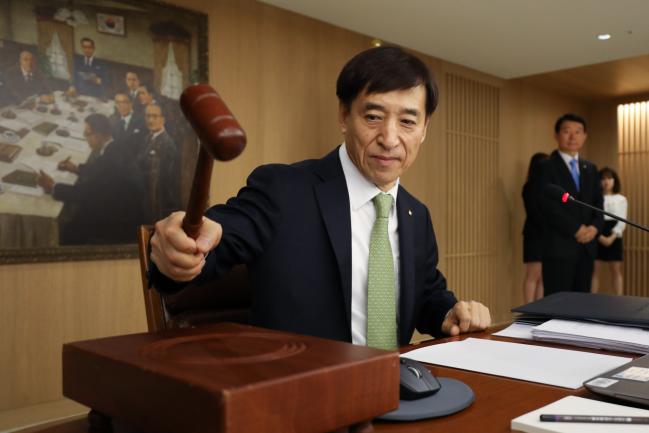 © Bloomberg. Lee Ju-yeol Photographer: SeongJoon Cho/Bloomberg
© Bloomberg. Lee Ju-yeol Photographer: SeongJoon Cho/Bloomberg(Bloomberg) — The Bank of Korea left its key interest rate unchanged, citing an escalating U.S.-China trade war as among rising risks to Asia’s fourth-largest economy. It trimmed growth forecasts for this year and next.
Governor Lee Ju-yeol made clear that for now price stability and caring for the economy — the BOK’s primary goals by law, he noted — would take priority over trying to curb financial imbalances such as record household debt and soaring house prices. Still, he said, those imbalances are a growing concern and the time to focus on them is coming near.
“Should the economy grow stably and inflation near the target, the main focus for the BOK will certainly become maintaining financial stability, because mounting financial imbalances will eventually affect the real macro economy,” Lee said.
Eleven of 18 analysts surveyed by Bloomberg had forecast the central bank would keep the seven-day repurchase rate at 1.5 percent on Thursday. The rest predicted a hike to 1.75 percent.
Two board members dissented from the decision, calling for a hike, Lee said.
Hawkish Signs
Some BOK watchers took Lee’s comments and the two dissenting votes, versus one in the last meeting, as hawkish signs.
“Governor Lee’s comment that the time is nearing to put greater focus on financial instability was sort of a signal that there was discussions among the policy board today that there will be an imminent rate hike in the near future,” said Park Seok-gil, an economist at JPMorgan Chase & Co (NYSE:).
The won weakened as much as 0.7 percent against the dollar, the most in a week, after the decision and Lee’s comments. The yield on 10-year government bonds was steady at 2.34 percent as of 1:33 p.m. in Seoul.
Competing Pressures
When Lee convenes the next policy meeting in November, a year will have passed since the BOK raised the benchmark rate from a record low. Lee has repeatedly said that policy accommodation needed to be reduced further.
Yet worries about spillover effects from the trade battle and emerging-market turmoil have been reasons for caution. So has a sharp slowdown in hiring at home. The central bank trimmed its 2018 growth forecast to 2.7 percent from 2.9 percent, and its 2019 outlook to 2.7 percent from 2.8 percent. It left its 2018 inflation forecast at 1.6 percent.
The central bank needs to balance the need to reduce policy accommodation against a weak labor market and slowing economic growth, said Woei Chen Ho, economist at United Overseas Bank Ltd. “While we expect the headline inflation to remain close to or slightly exceed the BOK’s 2 percent target in the next few months, inflation risks should be contained due to weak demand-side pressure from a sluggish jobs market,” she said.
Lee has also cited the need to more closely monitor the widening gap between Korean and U.S. interest rates.
Though it’s slowing a bit, South Korea’s economy has grown roughly in line with projections in recent quarters and inflation in September ticked up to 1.9 percent, just below the BOK’s target. Meanwhile, household debt continues to break one record high after another, supporting the argument among hawks that higher rates are needed.
Lee stressed Thursday that growth is expected to remain in line with the economy’s potential rate, and that the BOK’s position is to consider addressing risks to financial instability when the macro economy is stable.
“The time to put more emphasis on financial stability is near,” he said.
(Adds comments from Lee’s news conference, economist.)
Source: Investing.com

























